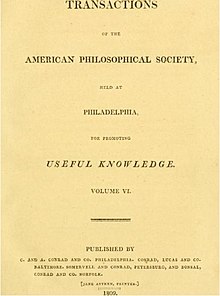American Philosophical Society
The American Philosophical Society (APS) was founded in Philadelphia in 1743 by Benjamin Franklin , John Bartram , Francis Hopkinson, and others . This philosophical society promotes many disciplines in the humanities and natural sciences through research grants, the publication of journals, the maintenance of an extensive library and regular meetings . She has an international reputation and played a significant role in American intellectual life.
building
The headquarters are in Philadelphia, where the Society's historical buildings are also located, including the Philosophical Hall (104 South Fifth Street in the Independence National Historic Park of Philadelphia), which was built from 1785 to 1789 as the Society's headquarters and is now the APS Museum (but also Parts of the administration) and became the 1965 Historical National Landmark. Opposite was the library (Library Hall) from 1789/90, which was later destroyed but was rebuilt by the APS with a reconstructed facade. Society meetings are held at Benjamin Franklin Hall (425-429 Chestnut Street), a 19th century bank building. Parts of the administration are housed in the neighboring Richardson Hall.
History and Notable Members
Early members included and included George Washington , John Adams , Thomas Jefferson , Alexander Hamilton , Thomas Paine , Benjamin Rush , James Madison , David Rittenhouse , John Marshall, and early foreign members Alexander von Humboldt , Marie-Joseph Motier, Marquis de La Fayette , Friedrich Wilhelm von Steuben , Tadeusz Kościuszko and Princess Daschkowa (elected in 1789 and first woman in the APS). Soon after their founding, they lapsed into a period of inactivity from 1746 to 1767, before they merged with the American Society for Promoting Useful Knowledge in 1769 under a new name ( American Philosophical Society Held at Philadelphia for Promoting Useful Knowledge ). The first president was Benjamin Franklin, then the most important American scientist and a leading politician. At that time, the company had a standing committee to evaluate innovations such as sewer construction projects. After the American Revolution , Francis Hopkinson took over the reins, who had signed the Declaration of Independence and under whose influence the APS obtained land from the state in Philadelphia to build their assembly hall.
In 1834 a committee for meteorology was founded in cooperation with the Franklin Institute under the direction of James Pollard Espy , which set up a network of stations for weather observation.
Many famous scholars and public figures were members, including John James Audubon , Charles Darwin , Louis Pasteur , Robert Fulton in the 19th century, and Thomas Edison , Linus Pauling , Albert Einstein , Robert Frost in the 20th century. The members are elected by the society. There are (as of 2019) around 1000 members, of which 840 are resident members (citizens of the United States or with permanent residence there) and 160 foreign members from around two dozen countries. From 1743 to 2019 there were a total of 5676 members, of which over 260 received the Nobel Prize. There are five classes: Class 1 Mathematical and Physical Sciences, Class 2 Biology and Medicine, Class 3 Social Sciences, Class 4 Humanities, and Class 5 other members of public life and the arts (Professions, Arts and Affairs).
Publications
The APS has published the Transactions of the American Philosophical Society ( ISSN 0065-9746 ) since 1771 . According to JSTOR , it is one of the oldest scientific publications in the United States . In the Transactions , events in the APS were first reported, including elections or deaths, and it is now a series of publications in which five monographs appear per year .
The Proceedings of the American Philosophical Society ( ISSN 0003-049X ) have been published since 1838 and publish the work presented at the Society's twice- yearly meetings. In addition, authors can submit articles for peer review .
The Memoirs , a second series of monographs with books from various disciplines, have been published since 1937 .
The APS also published the collective works of Benjamin Franklin, Joseph Henry , William Penn , Meriwether Lewis and William Clark .
Company prices

The company has been awarding the Magellanic Premium for services in navigation, astronomy and natural sciences since 1790 . It is the oldest scientific award from an American organization that is still being awarded. Other prizes include the Judson Daland Prize for excellence in clinical research, the Benjamin Franklin Medal , the Barzun Prize for Cultural History, the Lashley Award in Neurobiology, the Lewis Award, and the Thomas Jefferson Medal for excellence in the arts, the humanities and the world Social sciences.
Web links
Individual evidence
- ^ History of the American Philosophical Society
- ^ Armand N. Spitz: Meteorology in the Franklin Institute . In: Journal of the Franklin Institute 237 (4), April 1944, pp. 271-286, doi : 10.1016 / S0016-0032 (44) 90165-1 .
- ↑ APS, elected members , accessed October 28, 2019
- ↑ a b c APS Publications . American Philosophical Society website. Retrieved November 3, 2019.
- ^ Transactions of the American Philosophical Society on JSTOR . Retrieved November 3, 2019.
- ^ Proceedings of the American Philosophical Society on JSTOR . Retrieved November 3, 2019.
- ^ The Magellanic Premium of the American Philosophical Society , American Philosophical Society website. Retrieved October 29, 2019.


